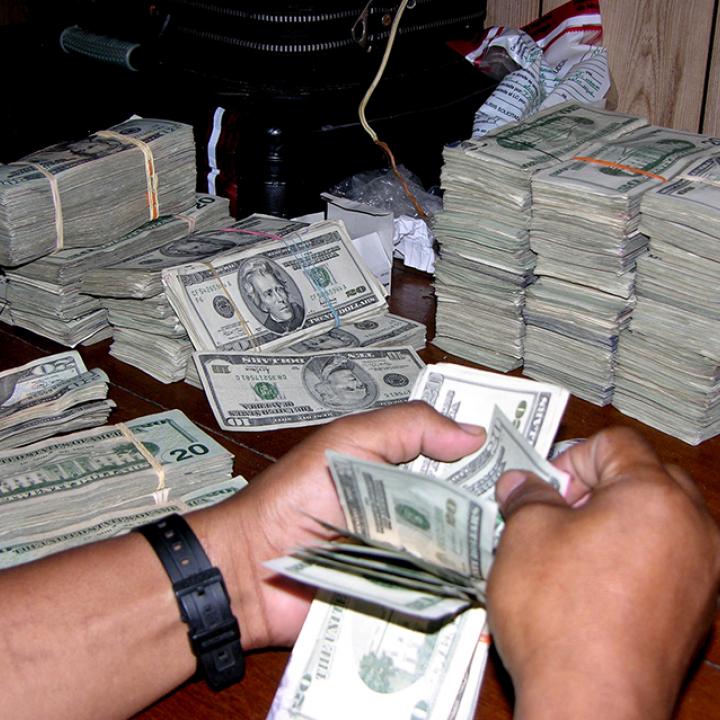
- Policy Analysis
- Articles & Op-Eds
The Crackdown on Hezbollah’s Financing Network

Hassan Nasrallah has challenged Western governments to produce evidence of the group's illegal activities, and the Treasury Department appears to be doing just that via new sanctions.
Hezbollah is facing hard times. Defending the Assad regime in Syria is a drain on personnel, funds, and military resources; it has produced losses on par with what the group suffered over 18 years of fighting Israel. Meanwhile, longtime sanctions and the decline in oil prices have led Iran to cut back support. The effects can be seen in Lebanon, where Hezbollah has cut salaries of some personnel, deferred payment to suppliers, and slashed monthly stipends to allied parties.
Yet when Hezbollah leader Hassan Nasrallah gave lengthy televised addresses last month and in July, he focused on other issues: denying that Hezbollah engages in commercial activities and declaring "unjust" charges that Hezbollah has ties to drug trafficking and money laundering. The vehement denials are a response to intensifying efforts by the U.S. and key allies to target Hezbollah's drug trafficking, money laundering, and arms procurement.
The Treasury Department is moving more frequently to designate terrorists and targeting key individuals and companies facilitating Hezbollah's international misdeeds, with a focus on those with ties to the Islamic Jihad Organization, Hezbollah's terrorist arm. The Justice Department has been working with European governments to arrest suspects in "far-ranging money-laundering probes touching Europe, South America, North America and Africa," the Wall Street Journal reported last month. President Barack Obama signed legislation in December that aims to "thwart" the group's "network at every turn" by imposing sanctions on financial institutions that deal with Hezbollah or its al Manar television station.
The Treasury designations -- which freeze assets and impose sanctions -- kicked into high gear in June when the U.S. targeted a high-level operative, Adham Tabaja and his company, al-Inmaa Group. Already, Treasury had targeted Hezbollah's military procurement front organizations and some of the businesses that run them, such as Stars Group Holdings in Lebanon and foreign subsidiaries that supplied components for the unmanned aerial vehicles Hezbollah deploys over Syria and Israel. Treasury also targeted associates of Mr. Tabaja -- one, Husayn Ali Faour, is a member of Hezbollah's Islamic Jihad whose company supplied vehicles -- and other Hezbollah procurement agents and financiers.
A Treasury official said this month that Hezbollah "relies upon accomplices in the business community to place, manage and launder its terrorist funds." Justice Department investigations into suspicious transactions led to the arrest of a U.S. citizen working in Colombia last June and another arrest in Lithuania as part of a money-laundering case. Washington is seeking the extradition of both men. October brought arrests of a lawyer in Paris and a businesswoman in Atlanta who, according to the criminal complaint, conspired to launder narcotics proceeds and engage in international arms trafficking. The businesswoman told an undercover agent that she had associates in Hezbollah who were seeking to purchase cocaine, weapons, and ammunition, the U.S. government has charged; the lawyer suggested that he could use his connections with Hezbollah to provide security to narcotics shipments.
These sorts of actions concern Mr. Nasrallah, who lamented in his speeches that when the U.S. accuses people or businesses of having ties to Hezbollah, Lebanese banks "take measures" against those people or the accounts of their entities. The December legislation means that foreign banks will start doing the same -- or face U.S. sanctions.
Investigators have pursued so many Hezbollah-related cases in recent years -- in particular, following the financial trail of narcotics trafficker Ayman Joumaa across continents, and actions in early 2011 targeting the Lebanese Canadian Bank under the USA Patriot Act -- that the group can no longer pretend to ignore them. The trail has led to the inner circle of Hezbollah's leadership, including Abdullah Safieddine, the group's representative to Iran and a cousin of Mr. Nasrallah.
In his December speech, Mr. Nasrallah challenged his accusers: "Bring me the evidence!" The U.S. and other countries appear to be doing just that.
Matthew Levitt is the Fromer-Wexler Fellow and director of the Stein Program on Counterterrorism and Intelligence at The Washington Institute. This article originally appeared on the Wall Street Journal blog "Think Tank."
Wall Street Journal



